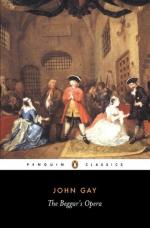|
This section contains 5,342 words (approx. 18 pages at 300 words per page) |

|
SOURCE: "John Gay: A Satirist's Progress," in Essays in Criticism, Vol. XIV, No. 2, 1964, pp. 156-70.
In the following essay, Spacks considers the strengths and weaknesses of Gay's satiric efforts, concentrating on his satiric epistles and the Fables. Comparing Gay primarily to Pope, Spacks suggests that Gay's recognition of his own feelings may have blunted the point of some of his satire.
Several years ago, in 'The Muse of Satire', Maynard Mack, reminding us that 'all good satire … exhibits an appreciable degree of fictionality', isolated three distinguishable 'voices' characteristic of the personae in Pope's formal satires: those of the satirist 'as vir bonus, the plain good private citizen', as ingénu, and as hero, or public defender. The 'total dramatic development of any one of [Pope's] formal satires is', Mr. Mack concluded, 'to a large extent determined by the way they [the voices] succeed one another, modulate and qualify...
|
This section contains 5,342 words (approx. 18 pages at 300 words per page) |

|


